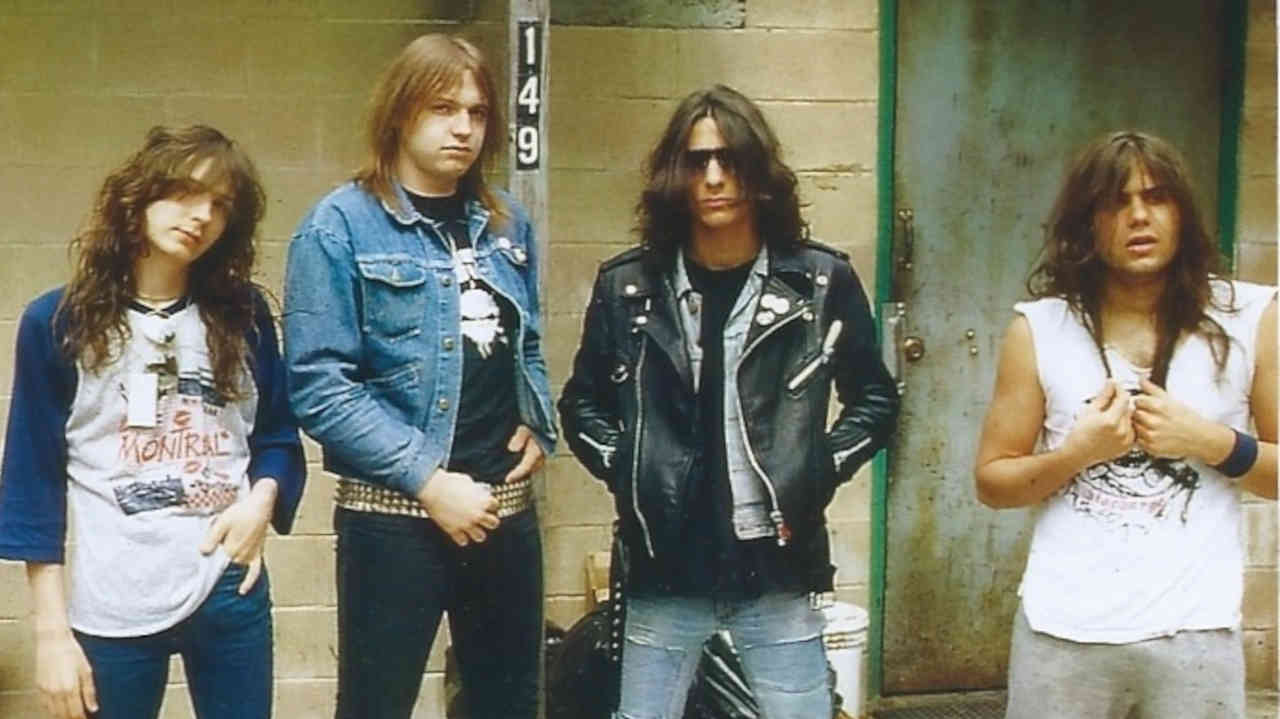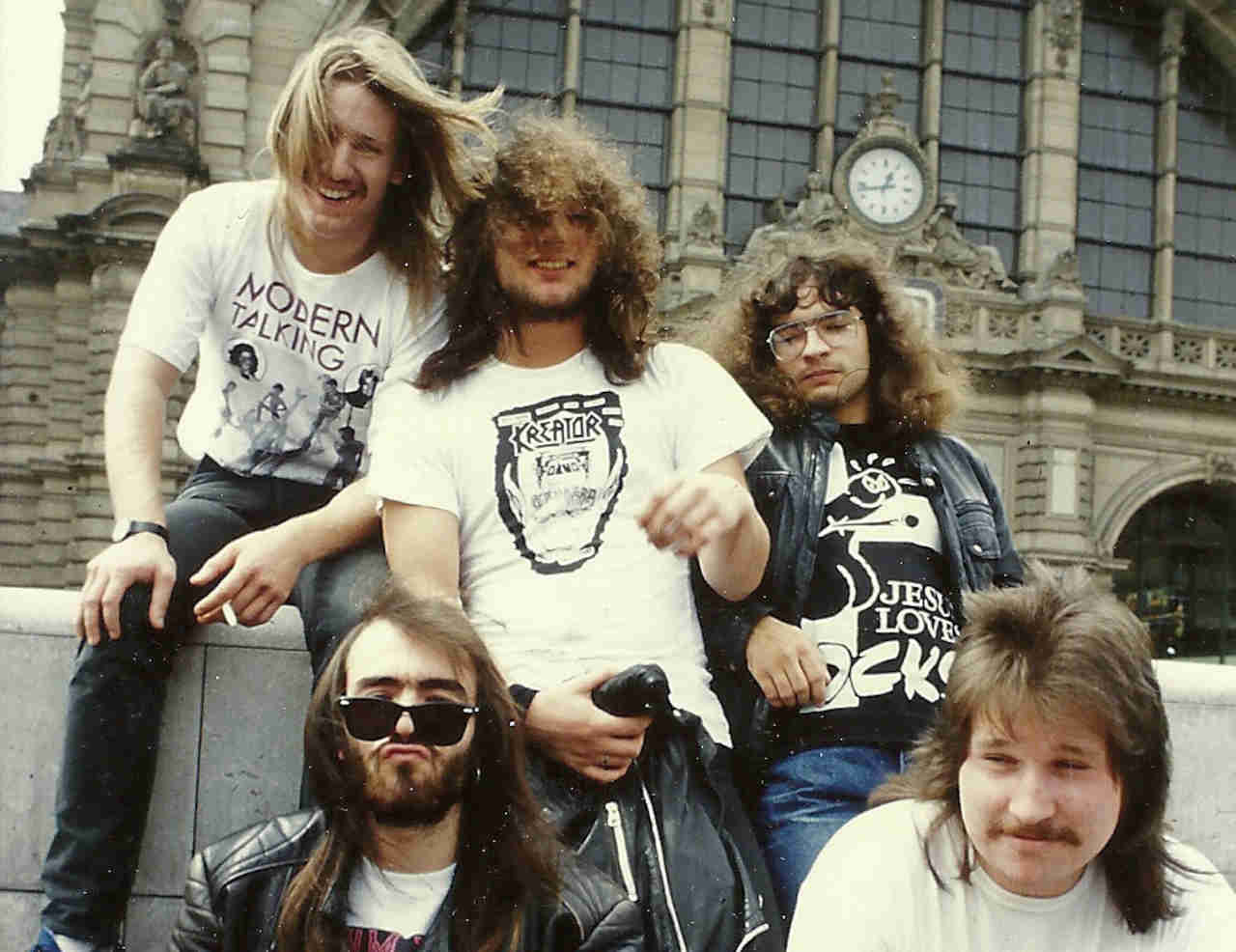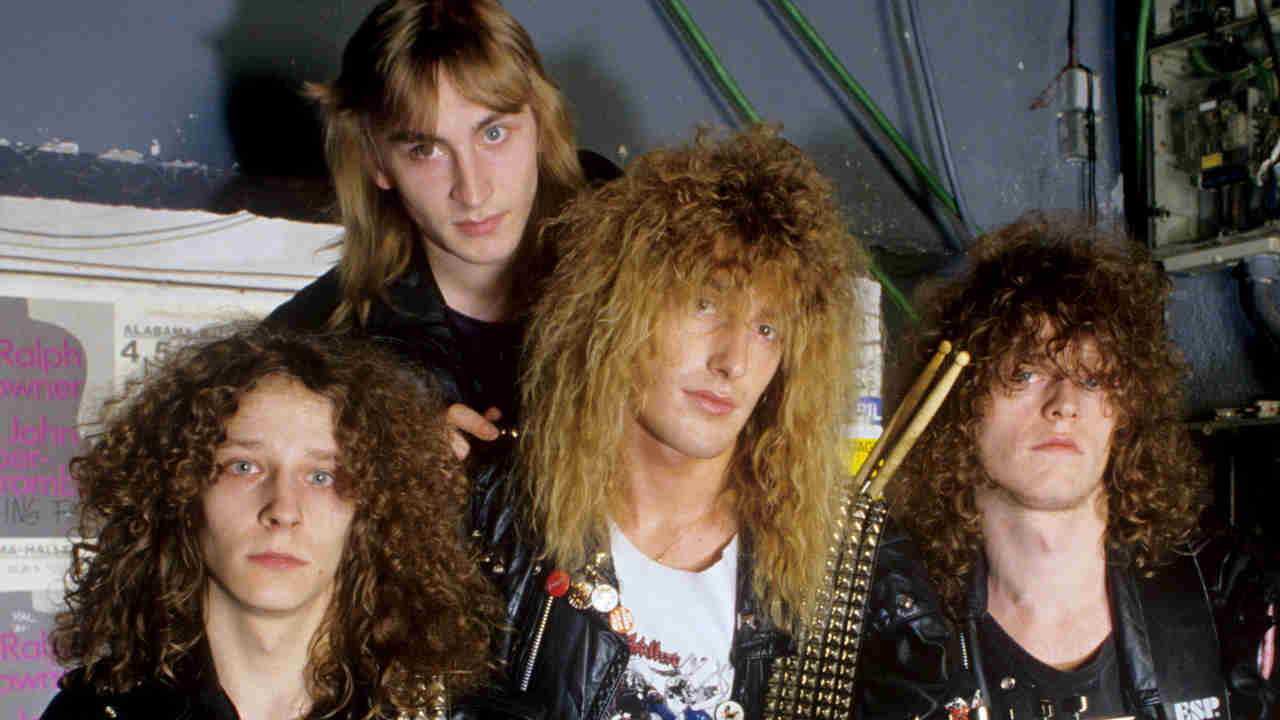As thrash metal extended its beer-stained tentacles around the world in the mid-80s, it would be easy to lay all the credit at America’s feet. And granted, the likes of Metallica, Slayer, Exodus, Anthrax and Megadeth pioneered the sound and style. But they didn’t do everything themselves.
Rewind to the early 80s. Many thousands of miles away from San Francisco’s Bay Area, something faster, darker and altogether nastier than American thrash was taking shape. As any self-respecting headbanger will tell you, Germany was the place to go if you liked your music brutal, aggressive and dirty as hell.
“Back then we wanted to listen to anything but the pop stuff we listened to when we were kids,” says Mille Petrozza, vocalist and guitarist with Kreator, arguably the biggest and best of Germany’s thrash bands. “The first thing I got into was Kiss, and then I wanted something heavier and so I started listening to bands like Priest, Tygers Of Pan Tang, Raven and all these British bands. That didn’t last long, because then we listened to this band from England called Venom and that changed everything. They had a big effect on us and that’s when we became extreme metal. We played at twice the speed, twice the intensity and tried to be just brutal. That’s when it all started.”
Metal has always had a huge, passionate and loyal audience in Germany, and as the 80s began the genre was experiencing a peak that would last for most of the decade to follow. Whether it was Priest, Maiden and Sabbath, or home-grown acts like Scorpions and Accept – the latter a clear and oft cited influence on the thrash scene in Germany – heavy music was a big deal. But no-one was prepared for the sheer mind-flaying intensity of the music that would erupt as German thrash metal bands emerged to take on the opposition on the other side of the Atlantic.
Almost in direct parallel with America’s so-called Big Four, Germany had its own unholy Big Three; the brutish and primitive Sodom, from the small industrial city of Gelsenkirchen; Kreator, from the larger but no less bleak Essen; and Destruction, from the south-easterly rural town of Lörrach. These three bands, alongside a smattering of other groups including the ferocious Holy Moses – led by the first lady of German thrash, Sabine Classen – Tankard, Darkness, Mekong Delta, Violent Force and Living Death, swiftly proved that thrash was far more than a solely American phenomenon.

Perhaps more importantly, the Germans took the genre somewhere entirely new and much less pleasant than their Californian and East Coast counterparts. Listen to the debut albums by Kreator (1985’s Endless Pain), Destruction (Infernal Overkill from the same year) and Sodom (1985’s proto-black metal In the Sign of Evil EP), and there’s a level of wild intensity on display that remains unmatched in thrash’s illustrious canon.
“The Americans always had more commercial songs, I guess,” says Schmier, frontman with Destruction. “In Germany it was all about being brutal and being the heaviest thing ever. It wasn’t about writing good hook lines. It was about being mean. Americans tried to write songs and have hooks and good harmonies. We didn’t care about that. We just wanted to be filthy!”
“When we recorded our first album we were 16 years old,” says Petrozza. “So it was all very naïve. We were so excited that we were able to record an album, that we released pure energy. We tried to capture it again on the later albums, but that moment when you go into a studio for the first time and you feel the magic of creating something together and making something out of nothing, it’s hard to repeat. I think that was one of the reasons why German thrash seemed so chaotic at the beginning. We weren’t really good at playing our instruments but we were raw and the music was brutal and exciting.”
Given how violent and heavy some of the music emerging from the States was at the time, it might seem silly to start claiming that German thrash was that much more aggressive, but listen to something like Kreator’s Endless Pain or Sodom’s Obsessed By Cruelty and you can actually hear the bands taking the template laid down by Slayer and Possessed and gleefully cranking everything up a notch or two. A far cry from Anthrax’s boisterous singalong or Megadeth’s technical precision, German thrash was a twisted and malevolent musical force with a suitably menacing image – all black leather, studs, spikes and scowls –to match; a reflection, perhaps, of the oppressive environments in which these bands grew up and learned their craft.
“I think the sound of thrash in Germany had a lot to do with the towns we came from,” says Sabine Classen, singer with Holy Moses, who released their own debut album, Queen Of Siam, in 1986 via the fantastically named AAARRG Records. “Ourselves, Sodom and Kreator, we all come from the Ruhr District, and there are really hard-working people there, working class people. Tom from Sodom, he worked in the coal mines, like my father did. Automatically you do darker stuff if you come from surroundings like that. The sun is not shining and it’s raining all the time and we have long winters. It’s very different from San Francisco!”
“I don’t know if being working class was that important,” muses Petrozza. “But maybe on a subconscious level it made what we did even darker and more aggressive.”
Even though thrash metal had become a substantial presence in the rock world and bands like Metallica and Megadeth were enjoying healthy record sales, by the mid 80s it was still a defiantly underground scene and would remain distanced from mainstream interests until the end of the decade. For American bands, there was always the promise of a high-profile tour or regular appearances on MTV to soften the blow of obscurity, but for German bands the task of reaching out to this rapidly expanding global audience was an arduous and problematic one; a situation that inspired them to try all the harder to clamber over each enervating obstacle.
“Everything was really new to us all,” says Sabine Classen. “The best thing was that there was this whole network of bands and people building up. As a German band it was hard to get the best instruments, to get an original Marshall amp or to get the leather clothes. We’d see bands like Slayer and they had better outfits than us! I remember driving to London to buy stuff because you couldn’t get it in Germany. But it was a great time, discovering everything and supporting each other. These days, everything is presented to you, on the internet and in magazines, and the stores are full of CDs. We had to find everything out for ourselves, but it was exciting and it taught us to believe in what we were doing.”
“At the end of the 80s we got signed by a major American label,” adds Petrozza. “When you’re not from America or willing to move there, it’s hard to get on the same level as the US bands because you need to constantly tour the States if you want to be as big as Metallica or Slayer. I think when you’re from there, you tour three times a year and you’re on tour for half of your life. We tried to get on a lot of big tours but there were politics involved. We had to work harder then everyone else to achieve what we did.”
As German thrash became better established, a whole slew of like-minded bands started emerging from other parts of Europe. Bands like Artillery from Denmark, Coroner from Switzerland and Sabbat from the UK each brought their own unique take on thrash metal to the table, but none of their respective nations ever managed to establish a unified and cohesive scene like the one that spawned Sodom, Kreator and Destruction; three bands that have somehow survived the perils of the 90s – give or take the occasional brief hiatus –and are still releasing records worthy of their collective legacy.

“There was definitely a rivalry between Sodom and Kreator,” laughs Schmier. “They were friends but they were always watching each other. We came up from the south, from the hillbilly countryside, and we could see that they were friends but fighting each other to see who was better. But there was always friendship and it’s lasted over the years. It was a special time. We were young and wanted to play, so it was great that we found people with the same views and direction. In the countryside, we were the first metalheads so we were happy that we’d found some other people like us. It meant we could go on and believe in what we were doing.”
The 90s was a hard time for metal in general, but thrash took a particularly savage beating at the hands of grunge and nu metal, as record companies switched allegiance to whichever cash cow was wandering past the office window at any given time. Nonetheless, German thrash survived in style, as its uncompromising ethos and grimly unsophisticated aesthetic was enthusiastically endorsed and adapted by both the black and death metal scenes, much to the surprise of the bands themselves.
“It took me a long while to really believe that we’d had such a strong influence,” admits Schmier. “I remember when we first met Obituary and all the death metal bands and they’d say ‘You guys have been a big influence on us!’ and we didn’t believe it! We knew we were well known, but we didn’t think we’d influenced a new generation. At the end of the 90s I was really aware of it, because everybody kept saying that without Destruction and Sodom and Kreator there wouldn’t be death metal or black metal. We were the start of something more brutal. It’s good to see the evolution going on and people recognising that we were originators.”
All these years on, German thrash is in rude health as its biggest players remain in action, enjoying new-found levels of popularity from subsequent generations that have rediscover thrash over and over again. Unlike certain American bands from the same generation, the Germans have never lost touch with their roots and their unique approach to making life-affirming, face-melting heavy music remains one of the more startling phenomena in metal history. Frankly, no one does it better.
“Thrash metal is my fucking music,” concludes Schmier. “I don’t want to play anything else. I won’t be playing jazz in ten years’ time, but we’re not playing the same thrash we played 25 years ago. We’re evolving as musicians and writing good songs, but we still have the aggression of the early days. We’ll never lose that spirit.”
Originally published in Metal Hammer Presents The Story Of Thrash

